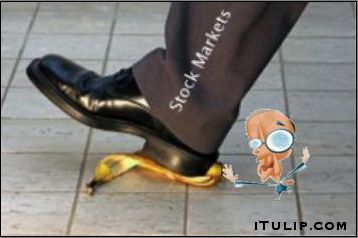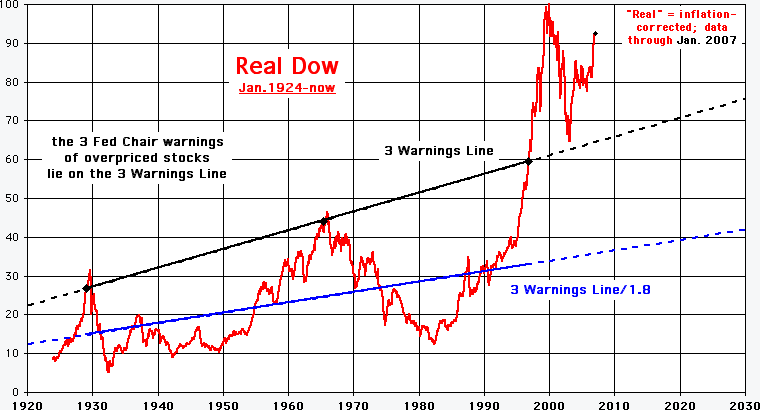 |
February 27, 2007 (Madlen Read – AP Business)
Dow Finishes Down 416 at 12,216, Nasdaq Finishes Down 97 at 2,408 on Global Market Plunge
NEW YORK (AP) -- Stocks had their worst day of trading since the Sept. 11, 2001, terrorist attacks Tuesday, briefly hurtling the Dow Jones industrials down more than 500 points on a worldwide tide of concern that the U.S. and Chinese economies are stumbling and that share prices have become overinflated.
The steepness of the market's drop, as well as its global breadth, signaled a possible correction after a long period of stable and steadily rising stock markets, which had not been shaken by such a volatile day of trading in several years.
AntiSpin: "But first, the wall," is how we finished our news on Thursday. "The Wall" is an obstruction that the stock markets need to hit at top speed before the housing market rate cut bail-out can happen. But what, we wondered, might cause the markets to slip?
The most popular speculation on what happened today, about why the DOW slipped over 500 points to close at 416, is that Chinese stock market investors care what Greenspan has to say. Speculators there were frightened by Greenspan's "possible recession" call yesterday. Then, later in the day, bourses fell around the world fell in sympathy. Risk was re-discovered, as usual, all at once. This is plausible, but unsatisfying. Talk of China's over-heated stock market has been floating for months, so a correction there can hardly be called a surprise. The only surprise, in retrospect, was not the Chinese market correction but Greenspan's recession talk itself.
I downplayed Greenspan's prognostication yesterday, noting his lousy record in the other direction. He famously failed to see the recessions that came in the early 1990s and in 2001. But I forgot what iTulip's own Real DOW analyst taught us a year ago.

Three Warnings
In a 3/7/97 article in The Wall Street Journal re. the then recent use in a 12/5/96 speech of the term "irrational exuberance" by Alan Greenspan, chairman of the Federal Reserve Board in Washington, the authors wrote: "Fed chairmen usually don't say much about the stock market. In fact, the only notable earlier Fed warnings date to 1929 and 1965."[1] (The Fed was founded in 1913.) Other reports agree [2]-[4].
In a discussion of these three "warnings that the stock market was overpriced," Shiller [5] wrote "It appears that Fed chairmen reserve public statements about market pricing for periods of extreme mispricing."
Evidently, in the more than 90 years since the Fed was founded in 1913, a Fed chairman has only 3 times publicly warned that the stock market was overpriced.
Fed or ex-Fed Chairmen talk about market pricing is exceedingly rare and rarely idle, and speculation about a possible future recession is, as far as I know, unprecedented. In a 3/7/97 article in The Wall Street Journal re. the then recent use in a 12/5/96 speech of the term "irrational exuberance" by Alan Greenspan, chairman of the Federal Reserve Board in Washington, the authors wrote: "Fed chairmen usually don't say much about the stock market. In fact, the only notable earlier Fed warnings date to 1929 and 1965."[1] (The Fed was founded in 1913.) Other reports agree [2]-[4].
In a discussion of these three "warnings that the stock market was overpriced," Shiller [5] wrote "It appears that Fed chairmen reserve public statements about market pricing for periods of extreme mispricing."
Evidently, in the more than 90 years since the Fed was founded in 1913, a Fed chairman has only 3 times publicly warned that the stock market was overpriced.
What did the Fed see to inspire the Fed to trot out Big Al to issue a rare public warning? Historically it means the Fed believe markets are extremely overpriced. But not only are U.S. markets are overpriced this time around but global markets, too. Perhaps the logic behind predicting a possible U.S. recession near the end of 2007 was to get a reaction short term–as everyone "knows" recessions get priced into markets six to nine months before the event. And as the global economy is dependent on U.S. demand, talking about a U.S. recession might have the effect of talking down global the markets, something a negative "irrational exuberance" type comment about the U.S. stock markets will not accomplish.
The motive? A rapidly deteriorating housing market and tightening credit markets pose a real danger to the economy and financial markets: a self-reinforcing process of debt deflation. Rate cuts are needed. But without a clear and present danger, the Fed cannot lower interest rates; given current inflation levels, until the markets hit The Wall, rate cuts will be seen by bond markets as reckless, and the currency markets will hammer the dollar, further increasing inflation premia.
Markets need to hit The Wall–to suffer a temporary correction or "return of volatility"–before the Fed can begin the program of three quarter point interest rate cuts that Goldman Sachs on February 15 told clients were due in 2007, but which nearly everyone else we talk to does not believe is likely.
Tomorrow, the bleeding is likely to continue–if this theory is correct–at a more modest pace, say, down another couple of percent. If I am wrong, and Greenspan's prediction and the correction today are coincidental, then something more significant may be going on, such as with the confrontation between U.S. and Iran.
In other news, we've started a special forum for iTulip members who are interested in trading notes on their experiences with Crooks Currency Options. So far, so good.
Comment